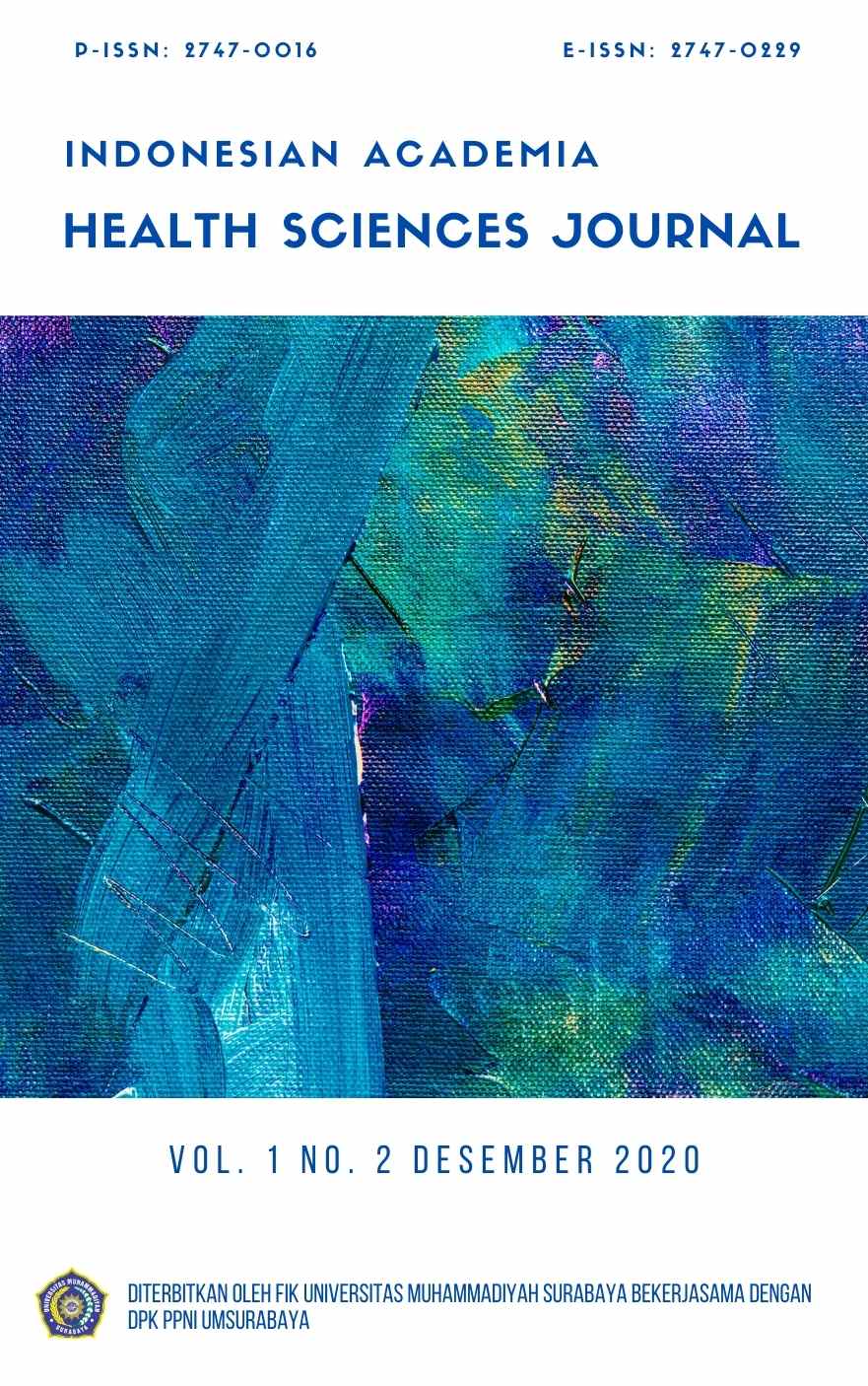Faktor - Faktor Yang Berhubungan Dengan Kualitas Handover Pasien Di Ruang Rawat Inap Rumah Sakit
Abstract
The purpose is to know the factors related to the quality of the patient’s handover in inpatient room of the hospital.
This research is a correlational analysis study with a cross sectional approach. Data retrieval uses questionnaires and observation sheets. The number of samples on this study is 79 nurses taken in random sampling techniques. Statistical analysis used is a test of spearman rank.
The results show that most of the respondents (69.6%) are diploma graduates, and 72.2% of respondents have a working time of < 5 years. Almost all respondents (93.7%) have good motivation, and 94.9% of respondents have good handover quality. The last educational variable (p = 0.388) and the nurse’s working time (P = 0.209) are not related to the quality of the handover, while the motivation (P = 0.000) and the implementation of the chief nurse’s supervision (P = 0.000) relate to the quality of the handover between the shifts in the inpatient room of the hospital.
The conclucion of this study is the motivation and the implementation of the chief nurse’s supervision relate to the quality of the handover between the shifts in the inpa- tient room of the hospital. Hospital’s management is expected to raise the motivation of nurses in conducting handover and enhancing the supervision of the chief nurse to improve the quality of the patient’s handover and minimize the errors in information exchange conducted by nurses.
Full text article
References
Andi Maya Kesrianti , Noer Bahry noor, Alimin Maidin Bagian. 2017. “Factor Affecting Commnication At The Time Of Handover In Inppatient Room Of Hasanuddin University Hospital.†: 13.
H., Zhu, McCrea N., and Kelsall W. 2014. “Improving the Paediatric Handover: Quality, Safety and SBAR.†Archives of Disease in Childhood 99(October 2013): A82. http://adc.bmj.com/content/99/Suppl_1/A82.1.abstract?sid=7c2d5155-15dd-4691-bb75-e3ce4b9f474d%5Cnhttp://ovidsp.ovid.com/ovidweb.cgi?T=JS&PAGE=reference&D=emed12&NEWS=N&AN=71566190.
Hughes, R., G. 2008. Agency for Healthcare Research and Quality. Patient Safety and Quality: An Evidence-Based Handbook for Nurses. U.S. Department of Health and Human Services,540 Gaither Road Rockville, MD 20850.
Joint Commision International. 2011. “Sentinel Event Data Root Cause by Event Type 2004-2010.†http://www.jointcommicion.org/assets/1/18/Root_Causess_by_Event_Type_2004-4Q2010.pdf.
Natasia, Nazvia, Ahas Loekqijana, and Janik Kurniawati. 2014. “Faktor Yang Mempengaruhi Kepatuhan Pelaksanaan SOP Asuhan Keperawatan Di ICU-ICCU RSUD Gambiran Kota Kediri Factors Affecting Compliance on Nursing Care SOP Implementation in ICU -ICCU Gambiran Hospital Kediri.†Jurnal Kedokteran Brawijaya 28(1): 21–25.
Negussie, Nebiat. 2012. “Relationship between Rewards and Nurses’ Work Motivation in Addis Ababa Hospitals.†Ethiopian journal of health sciences 22(2): 107–12. http://www.ncbi.nlm.nih.gov/pubmed/22876074%0Ahttp://www.pubmedcentral.nih.gov/articlerender.fcgi?artid=PMC3407833.
Rushton, H.C. 2010. “Ethnics of Nursing Shift Report.†Advance Critical Care: Ethnics in Critical Care 21(4): 3380–84.
Smeulers, M., Lucas, C., Vermeulen, H. 2014. “Effectiveness of Different Nursing Handover Styles for Ensuring Continuity of Information in Hospitalised Patients.†Cohrane Database Syst. Rev Online.
Sulistyawati, Wiwin. 2016. “Implementasi Fungsi Manajemen Dalam Pelaksanaan Discharge Planning.†Jurnal Kesehatan 10(1): 870–76. www.stikeshangtuah-sby.ac.id.
Sulistyawati, Wiwin, and Sri Haryuni. 2019. “Supervisi Tentang Komunikasi SBAR (Situation, Background, Assesmen and Recommendation Berpengaruh Terhadap Kualitas Handover Pasien Di Ruang Rawat Inap Rumah Sakit).†7(1): 19–26.
Toode, Kristi, Pirkko Routasalo, and Tarja Suominen. 2011. “Work Motivation of Nurses: A Literature Review.†International Journal of Nursing Studies 48(2): 246–57. http://dx.doi.org/10.1016/j.ijnurstu.2010.09.013.
Zahara, Yana, Ratna Sitorus, and Luknis Sabri. 2011. “Faktor-Faktor Motivasi Kerja: Supervisi, Penghasilan, Dan Hubungan Interpersonal Mempengaruhi Kinerja Perawat Pelaksana.†Jurnal Keperawatan Indonesia 14(2): 73–82.

